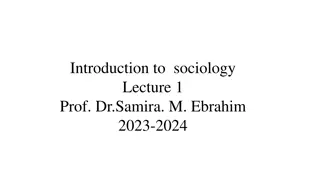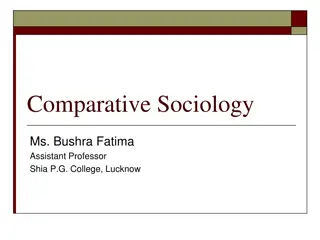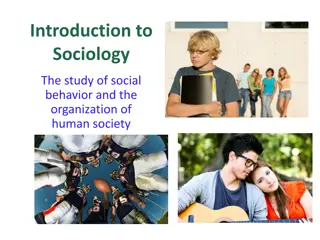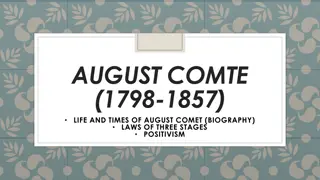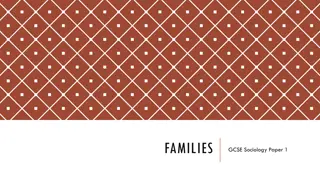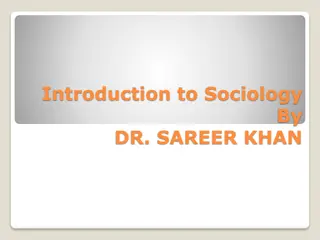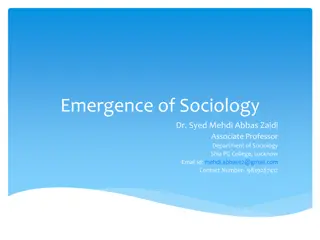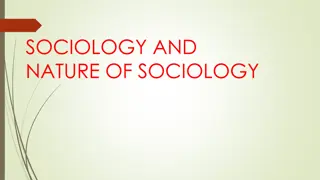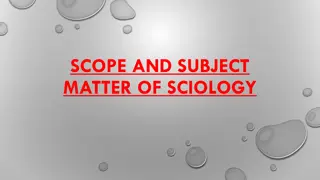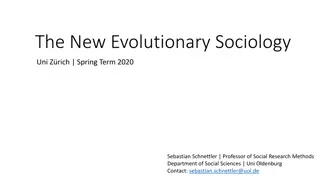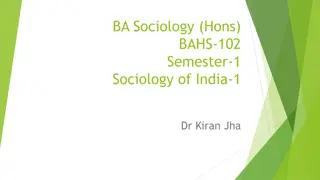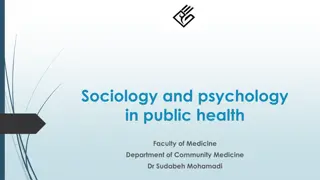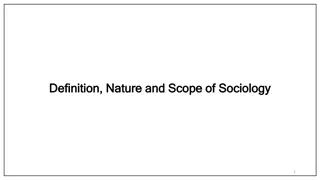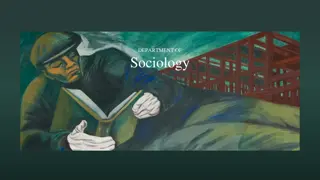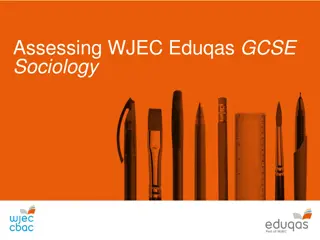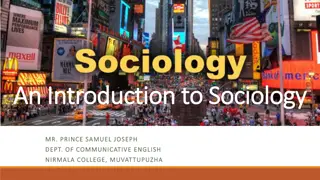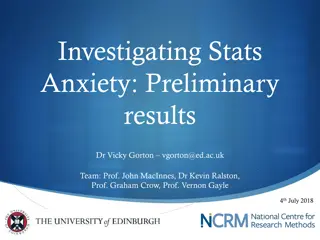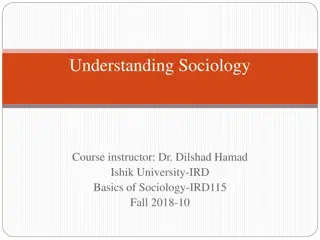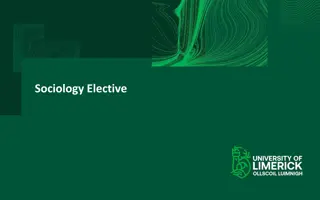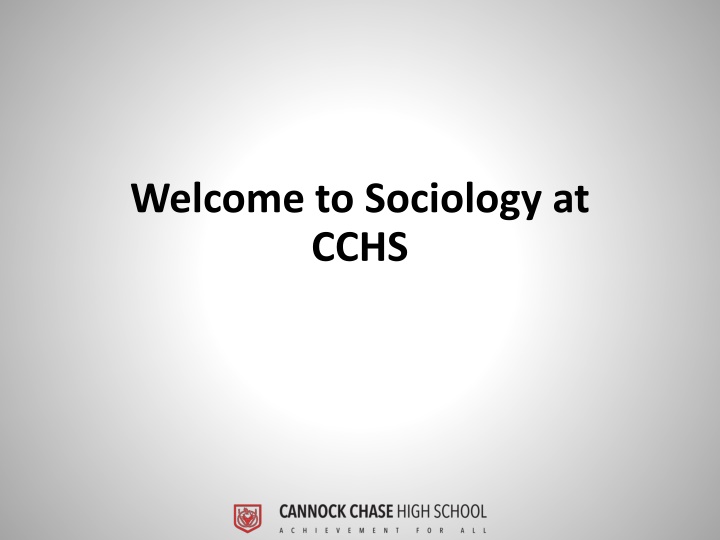
Sociology Studies at CCHS: Education, Families, Research Methods
Explore Sociology at CCHS covering topics like education, families, research methods, and social policies. Understand theories, roles, diversity, and methodology in sociology. Discover the impact of social groups and societal changes. Dive into different research methods used in sociology.
Download Presentation

Please find below an Image/Link to download the presentation.
The content on the website is provided AS IS for your information and personal use only. It may not be sold, licensed, or shared on other websites without obtaining consent from the author. If you encounter any issues during the download, it is possible that the publisher has removed the file from their server.
You are allowed to download the files provided on this website for personal or commercial use, subject to the condition that they are used lawfully. All files are the property of their respective owners.
The content on the website is provided AS IS for your information and personal use only. It may not be sold, licensed, or shared on other websites without obtaining consent from the author.
E N D
Presentation Transcript
Sociology A Level at Cannock Chase High AS Level (one year course) Paper 1: Education with Methods in Context Written ninety minute exam Paper 2: Research Methods and Topics within Sociology (Families and Households) Written ninety minute exam A Level (two year course) Paper 1: Education with Theory and Methods Written two hour exam Paper 2: Topics within Sociology: Families and Households and Beliefs in Society Written two hour exam Paper 3: Crime and Deviance with Theory and Methods Written two hour exam
Year 1 Year 1 Educatio Education n Role and function of education - Theories Functionalism, New Right Marxism, Feminism, Social Action Educational policies Have they created equality for all? - comprehensive system, private schools, grammar schools, marketisation, free schools, parentocracy, New Labour policies, Current Conservative government Achievement of social groups internal and external factors class, gender and ethnicity. Why do girls outperform boys? School processes and impact on achievement of social groups labelling, self fulfilling prophecy, setting and streaming, sub cultures, hidden curriculum
Year 1 Year 1 - - Families Families and Households and Households Theories of the family what is the role of the family? Is it a positive or negative institution? Couples are the roles shared equally? Childhood how childhood is socially constructed Changing family patterns marriage, divorce, cohabitation how do these changes affect the family? Family diversity different family types and whether this is good or bad for society Demographic changes patterns in births, deaths and fertility rates, migration patterns, sociological explanations of these Family and social policy policies that affect the family, both direct and indirect, sociological explanations of these
Year 1 Year 1 - - Research Research Methods Strengths and weaknesses of each research method: - Laboratory experiments - Field experiments - Questionnaires - Interviews; structured, semi- structured, unstructured, group - Participant observation covert/overt, - Non- participant observation covert/overt - Official statistics - Documents ! Methods
Year 2 Year 2 - -Beliefs Beliefs in Society in Society Theories of religion does religion cause conflict? Religion and social change Martin Luther King Secularisation how religion is becoming less significant in people's lives Religion, renewal and choice individuals can pick and choose different religions that suit their own identity Religion in a global context the impact of globalisation on religion e.g. the rise in Fundamentalism Organisations, movements and members sects, cults and new religious movements e.g. Scientology Ideology and science science vs religion
Year 2 Year 2 Crime and Deviance Crime and Deviance Functionalism, strain and subcultural theories how crime is functional for society, why people individuals join criminal gangs Interactionism and labelling theory how crime is socially constructed. The impact of being labelled by the police Class, power and crime crimes of the powerful Realist theories of crime solutions to crime and its influence on government policies Gender, crime and justice why men commit more crime than women Ethnicity, crime and justice why ethnic minorities are more likely to be stopped and searched by the police Crime and the media how the media exaggerates certain crimes and demonises individuals Globalisation, green crime, human rights and state crime cyber crimes Crime prevention, punishment, control and victims different types of punishment, who is more likely to be a victim of crime
Year 1 and 2 Theory Year 1 and 2 Theory and Methods and Methods Quantitative and qualitative methods; research design Questionnaires, interviews, participant and non-participant observation, experiments, documents, official statistics ( Primary and secondary data; qualitative and quantitative data. Positivism, interpretivism; 'social facts'. Consensus, structural and social action theories Modernity, post-modernity and sociological theory. Science and sociology Relationship between theory and methods Values and objectivity Sociology and social policy
Why study Sociology at CCHS and join the Social Learning Community An exciting, engaging subject Excellent results Specialist Sociology teachers (Miss Atkins)
Sociology Results 2019 Year 12 (AS): 100% A-E Most students exceed expected grades in Sociology and most progress to Y13 year Year 13: 100% A-C 60% A-B 40% A
What we expect from you Engagement and effort in every lesson. Attend and be punctual to 100% of lessons. Be well organised, keep an a4 lever arch file with your notes from lessons. Be enthusiastic about learning about the world around you and the society you live in. Good literacy and written skills.
What you can expect from us? Lessons that are well-planned and interesting. Appropriate lesson resources, including material to extend your knowledge and understanding. Support with assessments. Assessments that are marked to a high standard with clear feedback on how to improve.
Example task Example task - - Serial Killers Serial Killers Write down which 5 groups of people are the most common victim for serial killers in the UK... Children Elderly people Prostitutes Young runaways Homosexual people
Example task Example task Social Expectations Social Expectations Describe this woman (what would you expect her to be like?):
Example task Example task Social Expectations Social Expectations This is Dorothea Puente. One of America s most prolific serial killers Killed residents in her retirement home by poisoning them and claimed their pensions. She was discovered when in a particularly hot summer a neighbour complained about the smell coming from her property. Several bodies were found in shallow graves, another in the freezer. She was convicted for 7 murders but it is suspected she killed far more. Dorothea spent the rest of her life in prison publishing a recipe book called Cooking with a serial killer from jail. She never showed any remorse.
Sociology jobs... Social Researcher Counsellor Community Development Worker Police (both officers and police support) Advice Worker Social Worker Probation Worker Lecturer Charity Fundraiser Primary School Teacher Secondary School Teacher Youth Worker Human Resources Work Housing Manager Public Administration Prison Governor And many other graduate careers where a non subject specific degree is needed

